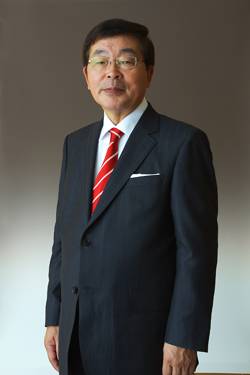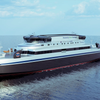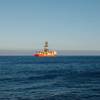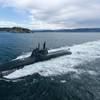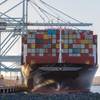Noboru Ueda's achievements at IACS
ClassNK Chairman and President, Noboru Ueda, served as Chairman of the Council of the International Association of Classification Societies from July 2010 until June 2011. In so doing, he became the fourth ClassNK chairman to complete a term at the head of IACS since the association was founded in 1968.
Noboru Ueda set three important goals for his tenure at the helm of IACS - to complete the transition to a more transparent and robust IACS structure and restate IACS commitment to the European Commission, to make proactive technical contributions to the maritime industry and the International Maritime Organization, with particular regard to greenhouse gas emissions and to better reflect the needs of the entire maritime industry.
An immediate result of the transition to a more transparent and open structure was the admission of the Croatian Register of Shipping and the Polish Register of Shipping as new members on May 3rd and June 3rd 2011, respectively.
During the year, ClassNK hosted and chaired Chairman’s Office meetings in Tokyo, London, Oslo and Kyoto, the 69th and 70th General Policy Group meetings in Tokyo and Seoul and the 62nd and 63rd Council meetings in London and Kyoto.
Mr Ueda took every opportunity to visit and maintain dialogue with the International Maritime Organization and leading industry organisations including The International Chamber of Shipping and the Asian Shipbuilding Experts Forum.
The immediate legacy of his term as Chairman of IACS was demonstrated most recently when a number of Asian industry groups participated in IACS Winter Council Meeting in London where, at Mr Ueda’s specific request, they joined regular European-based shipowner and shipbuilders’ association participants. The outcome was a more active and balanced exchange of opinion, with all parties making important contributions to discussions focusing on the key issues of Goal Based Standards (GBS), Common Structural Rules (CSR) and the Energy Efficiency Design Index (EEDI).
Representatives of Asian shipyards, who build by far the greatest share of bulk carriers and oil tankers, provided technical and practical insight and opinion on how best to develop and implement the new harmonised Common Structural Rules. At the same time, each of the participants contributed to the development of the rules by making clear their opinions and concerns and the dialogue highlighted the importance of the global industry working together to ensure successful implementation of the rules.
Commenting on the outcome of the meeting and whether Asian groups would continue to participate in IACS winter meetings, Mr Ueda said: “I think the most important outcome of the meeting was that beyond merely expressing our opinions, shipowners, shipbuilders and IACS were able to come to solid understanding and agreement about the challenges we face as an industry. I think the contributions of the Asian shipbuilders associations, who produce the majority of the world's vessels, played an extremely important part in the meeting reaching a successful conclusion. As a result of this success we anticipate that Asian shipbuilders will be able to play a more active role in future meetings of IACS and in the industry as a whole.
During his term as IACS chairman, Mr Ueda made keynote speeches and presentations on behalf of IACS at the Indian Shipping Summit in Mumbai, Tradewinds Shipping China in Beijing, the Shipping Corporation of India Golden Jubilee Seminar in New Delhi, the IMO World Maritime Day Parallel Event in Buenos Aires, a Tripartite meeting in Tokyo, the 4th Asian Shipbuilding Experts Forum meeting in Kyoto, the Connecticut Maritime Association meeting in Connecticut and the Seatrade Awards in London.
Mr Ueda’s term of office was characterised particularly by the determination of IACS to develop the Harmonised Common Structural Rules for oil tankers and bulk carriers. Demand for such rules had increased following the sinking of the Erika off France in 1999 and the sinking of the Prestige off Spain in late 2002, prompting the IMO to develop Goal Based Standards.
IACS began discussions on developing Common Structural Rules and, in June 2003, agreed to create one set for oil tankers and one for bulk carriers. The objectives included developing common minimum structural requirements for the design and construction of robust ships, rules based on transparent methods and rules supported by published technical background documents. IACS also determined to provide a rational link between the requirements for new buildings and ships in service and include the IMO Goal Based Standards concept.
In his keynote presentation on the main concepts and application of the Common Structural Rules to the China Green Ship Technology Conference in Shanghai in July 2011, Mr Ueda said the concepts underlying the development of the IACS CSR were to apply a design and fatigue life off not less than 25 years in North Atlantic environmental conditions, to introduce high level strength assessment for factors such as ultimate hull girder strength and to introduce the net scantling concept. The current CSR had been adopted by the IACS Council in December 2005 and had been applied to oil tankers and bulk carriers contracted for construction on or after April 1 2006.
Mr Ueda said it was important to realise that there were two different sets of CSR, one for oil tankers, and one for bulk carriers. While these two sets of rules were developed at the same time, they were developed independently by the Joint Tanker Team and Joint Bulker Team and, as a result, were based on different technical approaches for such key technical elements as wave load, fatigue, finite element method analysis and so on.
“Before IACS completed the current CSR, it sought feedback from industry, which strongly requested that common technical approaches be incorporated in both sets of rules,” Mr Ueda told delegates. “Even though IACS managed to partially harmonise the CSR prior to completion, in order to meet the demands of industry, IACS committed itself to completely harmonising the two sets of CSRs based on a consistent methodology in the future.
“Over this same time period, the IMO continued to develop the GBS following the completion of the CSR. The GBS and related amendments to the SOLAS Convention were finally adopted in May 2010. With the completion of the GBS, IACS decided to make the Harmonised CSR comply with the IMO GBS. Unlike the current CSR, which consist of two separate sets of rules for both oil tankers and bulkers, the new rules will cover both types of ships.
“In its final form, the Harmonised CSR will ultimately consist of three parts - a common part for the requirements of both oil tankers and bulk carriers, and then two dedicated parts for the specific requirements of oil tankers and bulk carriers. Given the tight schedule for the submission of Class Rules in conformity with the IMO GBS, we are currently focusing the majority of our efforts on developing the Harmonized CSR.
“At this time, there are no plans for developing Common Rules for ships other than oil tankers and bulk carriers.”
Mr Ueda pointed out that the development of the GBS at the IMO had been the catalyst for IACS’ decision to include compliance with the GBS as part of the harmonisation process. The IMO GBS comprised a hierarchy of five tiers - goals, functional requirements, verification of conformity, rules and regulations for ship design and construction and industry practices and standards. IMO provided Tiers I to III while the Harmonised CSR came under Tier IV.
In accordance with the IMO GBS framework, each class society’s rules incorporating the Harmonised CSR would need to be compliant with both Tier I and Tier II of the GBS. This compliance would then be verified by the IMO as part of Tier III verification of conformity.
With regard to one of the key elements of the IMO GBS, Mr Ueda made clear that the functional requirements consisted of 15 items that were further categorised into four fields - design, construction, in-service condition and recycling consideration. The main functional requirements for design and fatigue life were to be not less than 25 years under North Atlantic environmental conditions, with which the current CSR had already complied.
Although the GBS requirements had not been finalised during the development of the CSR, the current CSR were developed with a view to complying with the recently adopted IMO GBS requirements. As such, the current CSR already complied with most of the GBS requirements. However, because the CSR were completed in 2006 and the IMO adopted the GBS in May 2010, the current CSR do not comply completely with some GBS requirements. The functional requirements not covered by the current CSR included structural redundancy, residual strength after damage, hull dynamic effects on fatigue life, design transparency and so on.
“In order to meet these requirements, IACS will develop new requirements, revise the current requirements or prepare transparent technical backgrounds and consequence assessments as part of the CSR harmonisation project,” Mr Ueda said.
“As some requirements under development for compliance with the IMO GBS are quite new, it is possible that scantling requirements may be affected. On the other hand, I expect that scantling impacts and consequential impacts on ship operation cost from the Harmonised CSR will be limited because one of the main objectives of the Harmonised CSR is to integrate the two existing approaches for key technical elements.
“I must convey that it is premature to predict any scantling impacts from the Harmonised CSR. I can advise that IACS has started to conduct Consequence Assessments and will provide the industry with the outcome next year,” Mr Ueda said.
Under the auspices of the IACS structure for the CSR Harmonisation Project , ten teams working under the direction of the IACS Hull Panel were charged with carrying out the actual harmonisation work concerning wave load, buckling, finite element method analysis and so on.
“This work represents an enormous investment by IACS in terms of both financial costs as well as human resources,” said Mr Ueda.
With regard to the Harmonised CSR under development, IACS’ schedule provides sufficient time for external review prior to finalisation. However, in order to receive feedback from the industry before this review period, IACS has organised a special External Advisory Group and. To date, four meetings have taken place.
It is understood the first draft of the rules for review by industry will be released in the middle of 2012 following a consequence assessment, and that the external review will begin after this.
“In order to ensure that the External Advisory Group is balanced between all the different sectors of the industry, as IACS Chairman, I endeavoured to include not only ship owners’ associations but also shipbuilders’ associations in China, Japan and Korea in the membership,” Mr Ueda said.
“Once the preliminary review by the External Advisory Group and the wider maritime industry review are complete, each society’s Technical Committee will review the final rules text from March to May 2013.
“As the deadline set by the IMO for compliance with GBS verification is the end of 2013, IACS is working hard to complete development of the Harmonised CSR by that time. This schedule leaves little room for delays. As a result, IACS has made completion of the Harmonised CSR its top priority, while ensuring that there will be sufficient review periods. In addition, IACS member societies will provide the industry with software for verification in a timely manner.
“At some point of time, oil tankers and bulk carriers will be designed according to the Harmonised CSR instead of the current CSR. Although some new requirements will be added to comply with IMO GBS, ships complying with the current CSR remain among the best designed ships in the history of the industry, because the core of the rules will remain similar. Therefore, ships complying with the current CSR should not be considered as substandard.”
IACS, Mr Ueda said, was dedicated to developing new international technical requirements in order to ensure the safety of the maritime industry, protect the marine environment, and support the continued development of the maritime industry. Development of the new Harmonised CSR was one part of this process, and when completed, would help pave the way for a safer future for the entire maritime industry.



